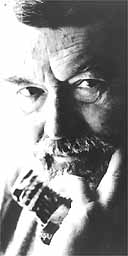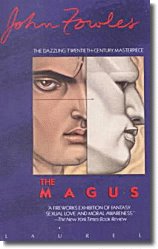 If you'd asked me who my favourite writers were when I was in my so-called "formative years", John Fowles would have been right at the top of the list, along with DH Lawrence and Graham Greene.
If you'd asked me who my favourite writers were when I was in my so-called "formative years", John Fowles would have been right at the top of the list, along with DH Lawrence and Graham Greene.Fowles died a few days ago, so it seems an apt time to remember the pleasure that his books gave me. I enjoyed The Collector and the French Lieutenant's Woman very much indeed. But The Magus was one of the most gripping books I've ever read.
It's a strange phenomena of reading, that you are doomed to start forgetting what you've read as soon as you put a book down, and more than thirty years on (it can't be that long, surely??) I can remember hardly anything about the plot or characters. But I can remember how the book made me feel. I couldn't bear to come up for air. I didn't want to take time out to eat or to sleep. And I was on an emotional roller coaster; chilled, thrilled, exhilarated by turn.
 Never mind that Fowles was a "post-modern" writer before the word was even a twinkle in the academics' eyes, he was a damn good story teller who teased and played with his audience, and I was under his spell.
Never mind that Fowles was a "post-modern" writer before the word was even a twinkle in the academics' eyes, he was a damn good story teller who teased and played with his audience, and I was under his spell.I ought to reread it. Want to reread it. Am afraid to reread it. In case the author's ghost has visited it and changed it in someway.
And because the me I am now will read with different eyes. (Wordly wise, dare I say? More cynical?)
I remembered as I read his obituary the other day, that I haven't yet read a couple of Fowles' novels: Daniel Martin and A Maggot. I just couldn't bear the thought of getting to the end of everything a favourite author had written, so I always left something to enjoy later on. (Not realising that tastes change and great stuff is being written all the time.)
Fowles' diaries have recently been published (how I wish I could afford the book but it's £30.00!). The Guardian printed an extract which gives an intriguing glimpse into his life (he wasn't a happy man, I think) and his thoughts on the three-ring circus of being a famous author:
The Magus comes out on May 2. A meeting with various literary editors at a lunch thrown by Cape; like being a horse and hearing the comments as he is led round the paddock. Not that they are anything but discreetly polite to my face; but I can hear behind their words. No one is further from a writer than a writer about writers; one's simplicity (given by the fact of creating), and their cynicism ...He wasn't in love with fame and its trappings:
Being published interests me a little less each year. I no more want to see myself in print now than a monk wants to do a vaudeville act.Rather :
All the pleasure is in the writing.(This should be our own acid test of how much we really want to be writers, shouldn't it?)
And there are intriguing insights into his creative process:
The French Lieutenant's Woman. I started this today. Not so much with a plot as a need and a language I wanted to use. It was really just one visual idea: a woman standing at the end of the Cobb and staring mysteriously out to sea.Time now to rediscover Fowles, I think.
12 comments:
I'm posting up Jordan's comment for him becasue he is unable to (as you will see!):
Today I read your blog entry on John Fowles. I knew (and still know) next to nothing about him or his literary output except for The Magus. I picked that book up at a great little neighbourhood bookstore in Halifax and was captivated by it, as you were. Its formidable length deterred me less and less as I navigated my way through its various twists and turns. Most of the time I felt as floored by each subsequent twist and turn as was the main character. Up until the ending I was ready to proclaim it one of the best books I'd ever read. Alas, the literary coitus interruptus Fowles performed at the end just left me doing the wrong kind of groaning. Still, an interesting read. Fowles really knew how to spin a yarn and tie you up with it.
I've only read French Lieutenant's Woman, last year. It was a fine book. All those narrative devices he used, self-insertions, multiple endings etc. It was just hilarious.
swifty - that's what postmodernism is all about, i guess. yes, a very clever book and again one that plays with the reader
anisah - think time speeds up as you grow older - it horrifies me to think i read some of my favourite books aeons ago ... glad i'm not the only one who can't bear to get the end of a favourite author's writings
Hi, I'm a bit wary of commenting here, 'cos what I've to share about John Fowles is nowhere as eloquent as what you've put -- so I won't :)
Just a comment about an author's passing -- in some ways, I'm envious of them. They've truly become immortal, haven't they?
ivan - it's great to have you commenting here and adding views. i'm sure you have lots of interesting insights about books and readers to share so pull up a chair and make yourself at home
immortality, yes. the rest of us can only envy ...
"Fowles Play".. what a fowle pun :P
Yeah, I was newly introduced to the concept of postmodernism when I first read the book. (it was part of one of my literature units last year) It was unbelievable since I never expected such devices to be used in published novels (... I see them more in fanfiction, but it never occurred to me that they were influenced by such postmodern works... silly of me)
"think time speeds up as you grow older"
That's just what I was telling someone the other day.. he wanted to know how it felt like to be my age. And yes it does seem that way.. that time flies faster as you age.
Well, I'm not sure I want immortality. I'd be like Edgar Rice Burroughs, people would read the books just to see how low standards were those days. I don't pretend for a minute I'm ever happy with what I write. A hundred years from now, I hope people understand that I wrote this way only to make a living. They might, and then again, they might not. A hundred years from now, people reading and laughing, reading and laughing, their laughter echoing back and forth over many millenia. Oh yes, I'd love to be immortal. Wouldn't you ? :)
swifty - postmodernism i found hard as a concept to get my head round ... though of course i recognise postmodern flourishes in literature ...
anon- there's medical evidence that shows that you actually perceive time differently as you grow older ...
yes, would like to be "immortal" - remembered for changing the world in some way no matter how small ...
Been there done that. I've actually received email from people telling me what I wrote made a difference in their lives. It's still not what I would have written though.
Post a Comment